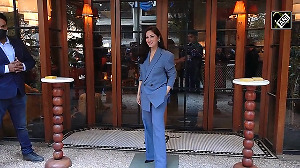You have to hand it to Finance Minister P Chidambaram.
After all the flak he's got on his proposals on the Fringe Benefit Tax and the one on withdrawing cash from banks, he's gone and blamed this on the fact that those who've come up with this interpretation, including tax experts who do this for a living, "are not lawyers" and "they do not know how to read the Bill."
He then topped this off with a magnanimous "I am not blaming them for this"!
No matter what the minister may choose to say now, there is little doubt that the Bill in its current form seeks to tax expenditure made by companies on all manner of things, and not just perquisites, as was announced by Chidambaram in Parliament.
Why else would the Finance Bill, which is what actually translates the Budget proposals into law, say 'fringe benefits mean . . . any reimbursement, directly or indirectly, made by the employer to his employees for any purpose' and later go on to say that 'fringe benefits shall be deemed to have been provided if the employer has . . . incurred any expense on . . . sales promotion including publicity; conveyance, tour and travel including foreign travel'?
While some provisions such as the employers' contribution to an approved superannuation fund are clearly something that can be categorised as a fringe benefit, surely the inclusion of 'sales promotion including publicity' is evidence of the taxman's mala fide?
Bad draftmanship, explains Chidambaram in quite the same manner that we journalists blame the printer for our errors.
He's argued, and quite earnestly, that everyone's being unnecessarily paranoid, that every law is made operational by certain rules, and that when the rules on the fringe benefits tax or on the cash-withdrawal proposal are made, these will take care of all the problems -- so, only genuine perks will get taxed and only tax-evaders will be caught by the tax-for-cash scheme.
While we'd all love to believe Chidambaram, the history of the tax department, particularly in recent times, is hardly inspiring.
While the finance minister appeared quite clear that he was planning to levy only a 2 per cent excise duty on branded jewellery (of the Tanishq type), newspapers have been full of news reports (as opposed to editorial comment that the FM appears to be contemptuous of) of how taxmen are harassing ordinary jewellers who do put their names on jewellery (like the neighbourhood tailor does on the humble shirt) but are hardly 'brands' in the sense that you and I understand the term.
There is, of course, the larger issue of the taxman behaving as though he is completely above the law. As this column has pointed out on various occasions, taxmen regularly force assessees to make higher tax payments and then refuse to give refunds on some pretext or the other when they lose the case in even the country's highest courts -- things got so bad that the Supreme Court had to come down on the practice and got the finance ministry's Central Board of Excise and Customs to issue a circular three months ago saying this would not be allowed in future and that officers responsible would be penalised.
Whether the taxman finally starts behaving himself is yet to be seen, but we all know what the government did when it lost the ITC case. That such retrospective change in the law wasn't a one-off thing has been brought out by the latest Budget, which seeks to make similar retrospective changes in other cases as well.
There has been a running dispute, for instance, on whether refining vegetable oil amounts to manufacturing (and reasonably so, given just how low the value addition is). This year's Budget says refining of edible oils is to be equated with manufacturing, right from 1986 onwards!
Similarly, a change has been made in the excise law to reduce the number of units that can avail of export and other benefits like the Duty Entitlement Passbook Scheme (DEPB).
While it requires a lot of technical detail to explain just how this works out, the operational part is what is interesting.
Today, a large number of units that have been granted exemption from paying excise prefer to make the payment since they get some additional benefits (like availing of modvat credit and DEPB benefits) by making the payment. The Budget now seeks to put an end to this option and says if you have an exemption, you are 'bound to avail of the exemption.'
Drastic, you'd say, but there may be some logic to it. But then how do you explain what the government has done in the case of service taxes, where Chidambaram said he was exempting those units that had an annual turnover of less than Rs 400,000 from this tax -- Notification Number 6, which deals with service tax, says 'the provider of taxable service has the option not to avail the exemption contained in this notification and pay service tax'!
Since the reason for paying the tax despite the exemption is the same in both cases (to be able to avail of modvat credit), why should the law be different?
It is, of course, due to instances like these that people don't trust the taxman. So when Chidambaram says 'trust me', no matter how high his personal credibility, few believe him.
After all, these are the same people who are sending out tax demands on DEPB benefits, despite knowing they are export benefits and therefore tax-free, and the same people who sent notices asking Indian Oil Corporation to pay customs duties on demurrage (the payment made to the ship's owner when the ship is made to wait for more than a certain period due to the ports being congested) payments made by it, and dragged it all the way up to the Supreme Court, where the case was finally dismissed.
Postscript: Chidambaram should be glad people reading the Budget documents are not lawyers since they will even use various case laws to interpret the provisions in a series of ways he cannot imagine!






 © 2025
© 2025